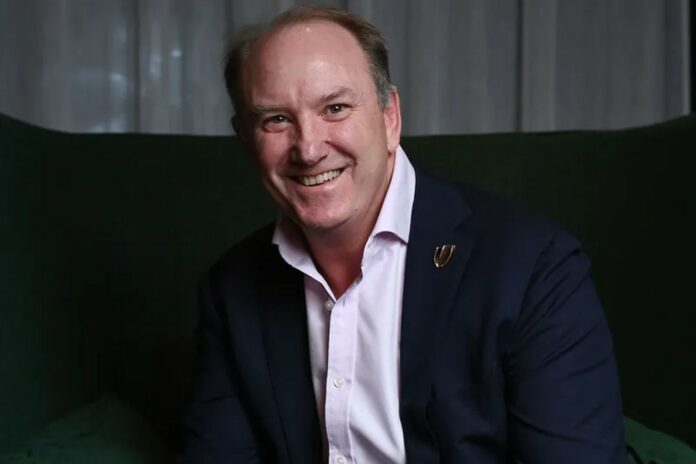
[ad_1]
New World Rugby chairman Brett Robinson faces a host of challenges but the matter of player welfare should be well within the scope of a man who once stated that people’s well-being was a priority.
The 54-year-old Australian not only brings empathy but also a distinguished playing career, having been capped 16 times by the Wallabies and captain of the ACT Brumbies.
Watch every game of the Wallabies Spring Tour live and exclusive on Stan Sport.
After hanging up his boots, he had spells in business and sports administration.
The knee specialist has a degree in medicine and went on to complete a PhD at Oxford University into improvements to an artificial knee.
That slots in comfortably with one of the principles the father of four adopted during childhood in Queensland.
“My personal purpose when I was growing up was always to be concerned about people’s well-being,” he told Australian media in 2021.
“I have a deep stake in that.”
It was the lack of well-being that his late father, John, who had Parkinson’s disease and died aged 81, experienced in a retirement home that sparked him to take a very different role.
Robinson accepted the job as chief executive of RetireAustralia, which has care communities around Australia.
He saw it as an opportunity to improve elderly people’s lives in a way that was lacking for his father.
“Dad was a brilliant man, a lawyer and later a vineyard operator, but he developed Parkinson’s and eventually we had to arrange aged care,” he told Australian media.
“The problem was it was well-meaning care, but very clinical and hospital-based. He lost control and basically the will to live.
“The system did not look after dad the way he deserved or that was respectful.
“If I can change that for other people I will be very proud.”
– ‘Be held back’ –
Now he confronts a very different beast and on a global scale with a range of interests vying for a say, from players to sponsors and different unions.
However, Robinson is a collegiate character and says he sees little difference between the two professional interests in his life.
“Sport and business have many similarities with the fundamentals of working in a team being the same,” he said.
However, one thing he learned from his stint in business is that the man at the top is pivotal to how it fares.
“The chair sets the tone for everything,” he told New Zealand newspaper The Post in August.
“They’re the leader of the board, they’re vital in making the board culture effective.
“They’re important for the relationship with the executive and getting things done.
“Having an effective chair will allow an effective board. If you are an ineffective chair, even great directors and a good executive team can be held back and don’t achieve their potential.”
Robinson caught the rugby bug in 1979 when Ireland were on tour Down Under, as has one of his son’s Tom, who is starring for the Australia Under-18 team.
Should Tom follow in his footsteps into the senior side, Robinson hopes that he will do so in a game that by then will be more spectator-friendly, due to it being speeded up.
He is pushing for the 20-minute red card to be permanently implemented, although World Rugby decided on Thursday to delay a decision to extend trials of a measure which is not universally popular measure.
Robinson also supports time limits on scrums-setting and kicking at goal.
This, he insists, will not come at the expense of player welfare, a subject he has taken a keen interest in having been a research investigator in a concussion study involving the Queensland Brain Institute.
Robinson seems set to bring more of a dynamic touch to the role than the urbane Bill Beaumont — and the Australian has indicated he has much work to do.
“World Rugby has matured, but it still isn’t there yet,” he told the Sunday Times in October.
“The system that we sit within is really creaking, if not broken.”
[ad_2]
Copyright for syndicated content belongs to the linked Source link

